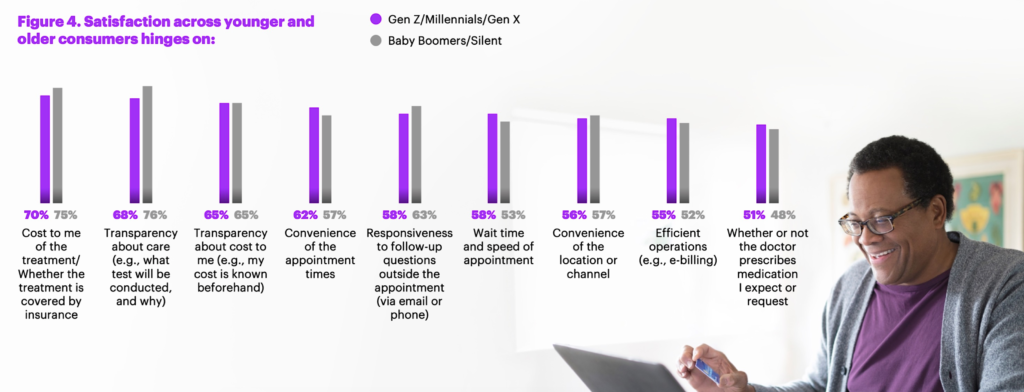This weekend, I studied an interesting survey published by Accenture Consulting on the prediction of future healthcare for younger consumers. It’s called ‘Accenture 2019 Digital Health Consumer Survey’ and the respondents of this study were from the United States though it essentially provided some wonderful insights into the millennial and Gen Z’s behavioural patterns in general. A striking feature of this survey was the influence of future technology on a wide range of generations beginning with the 20s and the millennials who would become the most influential generation for healthcare consumerism. These are some of my notes from the study.
Distinctive User Groups
At the onset, I came across one of the most distinct categorizations of the user age groups within this survey. The study has been fairly distributed among all classes of consumers including even the generation of consumers who were born in the late 20s. The list of the user group is comprehensive as noted below.
- Gen Z (born 1997 onward)
- Millennials (born 1981 to 1996)
- Gen X (born 1965 to 1980)
- Baby Boomers (born 1946 to 1964)
- Silent Generation (born 1928 to 1945)
Prominent Healthcare Insights
Traditional / Non-Traditional Healthcare – doctors, healthcare professionals, clinics, medical centres and doctor’s offices are some of the established types of traditional healthcare services. In contrast, walk-in or retail clinics, outpatient surgery hospitals, virtual health (via the phone, on video or apps), on-demand services or digital therapeutics are some examples of non-traditional healthcare services. [1]
- Younger consumers are moving away from traditional channels and adopting technology and non-traditional healthcare.
- The loyalty of younger generation patients is no longer assured, and the providers who heed to the changing dynamics of the consumers would be strongly positioned.
- Gen Z and Millennials are less likely to have a primary care physician (PCP) compared to Gen X, baby boomers and the silent generation.
[perfectpullquote align=”right” bordertop=”” class=”” cite=”” link=”” color=””]Gen Z is the most likely generation to seek out wellness practices (e.g. yoga, acupuncture) beyond Western medicine. With millennials projected to become the largest generation in 2019, this generation holds the most power to influence future healthcare models.[/perfectpullquote]
- Younger consumers — Gen Z and millennials are the most dissatisfied with the quality of traditional healthcare services. For instance, the Accenture survey acknowledges 18% of Gen Z and 21% of millennials were disappointed with the wait time and speed of appointment. In a recent post, I had provided my insights on wait time management.
- Consumers are increasingly making decisions based on convenience, affordability and reputation. [Slide# 5] It’s interesting to note, while we would happily saunter to our nearest walk-in clinic only 23% of Gen Zs responded to choosing a location which was convenient for them.
[perfectpullquote align=”right” bordertop=”” class=”” cite=”” link=”” color=””]In 2018, when Amazon acquired online pharmacy PillPack for just under a billion dollars, it was considered to be a game-changing event for the pharma industry, least of all, marking the entry of the e-commerce giant into the pharma industry. The purchase would enable Amazon customers to take advantage of the ‘same-day’ Prime service to order prescription medications, and going forward, customers could potentially order medications through Alexa.[/perfectpullquote]
- In what could be termed as a common component between the older and the younger generations, it’s not just the convenience of the service, it’s also the satisfaction, that will influence them to pick or drop the service.
- Younger generations place greater importance on the convenience of appointment times and wait time and speed of appointment. Whereas, older generations prefer transparency about care. [Slide# 6]

[perfectpullquote align=”right” bordertop=”” class=”” cite=”” link=”” color=””]According to a 2014 McKinsey survey, more than 70 percent of all older patients in the United Kingdom and Germany want to use digital healthcare services; in Singapore, that number is even higher. There is a difference between the kinds of digital channels older and younger patients want to use, though.[2][/perfectpullquote]
- The expectations for digital capabilities are rising. Consumers from all age groups are now requesting digital technologies to help them refill prescriptions to booking appointments. 70% of respondents are more likely to choose a provider that offers them digital services today than in 2016.
- Although, compared to older generations, younger consumers are much more likely to choose medical providers who offer digital capabilities. It’s interesting, however, that the millennials outdo Gen Zs in all aspects of requesting digital capabilities. [Slide# 9]
- As needs become more complex, such as, with mental health, physical injury treatment, etc., the interest in virtual care goes higher.
[perfectpullquote align=”right” bordertop=”” class=”” cite=”” link=”” color=””]Certain services, such as, cold/virus treatment, flu shots and checking vitals, are seeing a rise in non-traditional healthcare [walk-ins/retail walk-ins]. However, use of non-traditional healthcare remains high in other areas such as vaccinations, mental health treatment, STD screenings and treatment and major surgery.[/perfectpullquote]
Conclusions
- Companies ought to acknowledge the non-traditional care settings, with payers and providers adapting and considering greater use of digital capabilities in the coming days, including self-service options.
- In fact, consumers of all generations are more open to non-traditional services, while younger consumers are least satisfied with traditional care models.
- Consumers of all generations are expecting digital capabilities from providers, and are likely to choose only those which are capable of delivering.
- Younger consumers like Gen Z and millennials are less likely to prefer a primary care physician. compared with Gen X, baby boomers and the silent generations. Younger consumers also adopt wellness practices such as yoga and acupuncture.
- The millennials are projected to become the largest generation in 2019 and will hold enormous power to influence future healthcare models.
Sources:
[1] “Today’s consumers reveal the future of healthcare”, Accenture Consulting [Online]. Available: https://www.accenture.com/us-en/insights/health/todays-consumers-reveal-future-healthcare
[2] S Biesdorf, F Niedermann, “Healthcare’s Digital Future”, McKinsey & Company [Online]. Available: https://www.mckinsey.com/industries/healthcare-systems-and-services/our-insights/healthcares-digital-future


